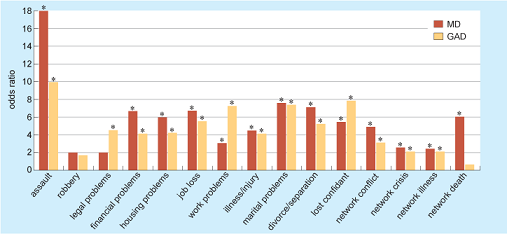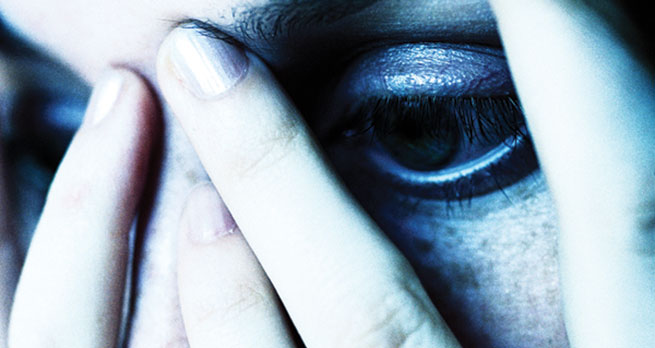1.2 Recent life events and stress
Many episodes of depression and anxiety are apparently associated with a severe or chronic stressor. Loss of a loved one, unemployment, divorce, poverty, racism and discrimination, illness, a car accident, being mugged, are just some examples. Research supports this notion. For instance, Kenneth Kendler and his team (e.g. Kendler and Prescott, 2006) found that the onset of episodes of major depression (MD) and generalised anxiety disorder (GAD) was strongly linked to stressful life events in the last month in their study population of women (Figure 2).

Activity 1 Linking MD or GAD to a stressful life event
Using the information in Figure 2, which disorder, MD or GAD, do women who have experienced assault tend to develop? Try to explain your answer.
Answer
Odds ratios in Figure 2 indicate the increase in the chances of women experiencing MD or GAD following different life events. After assault, the odds ratio for developing MD is 18, while the odds ratio for developing GAD is 10. Thus after an assault women appear more likely to develop MD than GAD.
The chances of experiencing depression and anxiety are increased if a number of stressful life events follow in quick succession, if events are experienced as severe, and if they involve significant loss or personal humiliation (Kendler et al., 2003).
The chances of experiencing such disorders are also increased if other risk factors are present (Turner and Lloyd, 1995). For instance, in January 2010, the Office for National Statistics (ONS) reported that the number of suicides in the UK had risen sharply since the recession began, reversing the downward trend of the previous decade. Suicides rose by 6% from 5377 deaths in 2007 to 5706 deaths in 2008 among people over 15. Commenting on these results, Professor Rory O’Connor of Stirling University’s Suicidal Behaviour Research Group said: ‘Sadly this increase in suicide is not unexpected given we know there’s a relationship between past recessions and an increase in suicides … as well as the financial implications, there’s added stress on families and relationships, as well as the loss of social networks to support people’ (Bowcott, 2010).
However, the situation is even more complex because some personality traits can kindle stressful situations. Some stressful life events are independent of our own actions, but in others our actions may have helped create the stressful circumstances.
Activity 2 Stressful life events and our actions
Can you think of an example of a stressful life event that is independent of, and one that may be dependent on, our own actions?
Answer
Natural disasters such as earthquakes and hurricanes would fall into the first category. Many relationship crises may fall into the second. You may have thought of other examples.
The chances of experiencing the second kind of stressful life event are higher in those with a ‘difficult’ or ‘neurotic’ temperament compared to those with a more ‘easygoing’ temperament (Section 1.5).
